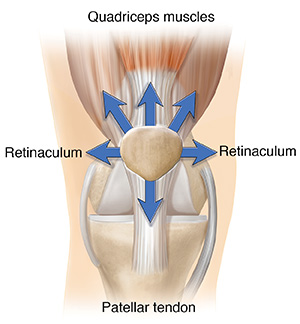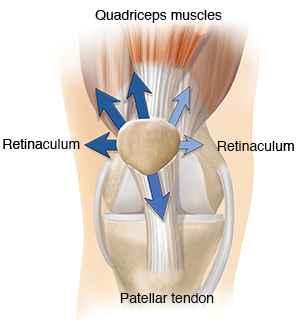The Kneecap (Patella) in Action
As the leg moves, the kneecap moves, too. It slides up and down its track on the thighbone. But if the kneecap slides "off track"—even a little—pain and damage can result.
When the kneecap is "on track"
The kneecap is controlled by muscles and ligaments that work like a system of pulleys. This system includes the quadriceps muscles, retinacula, and patellar tendon. If all these parts pull in just the right way, the kneecap stays in place and glides easily in its track. Pressure is spread evenly on the back of the kneecap.
 |
| Kneecap on track. |
When the kneecap gets "off track"
An injury can cause some muscles or ligaments to pull too hard or not hard enough. When that happens, the kneecap no longer glides easily against the thighbone. The kneecap may even tilt. Pressure may be spread unevenly on the back of the kneecap, causing wear and tear on the cartilage.
 |
| Kneecap off track. |
Online Medical Reviewer:
Marianne Fraser MSN RN
Online Medical Reviewer:
Rita Sather RN
Online Medical Reviewer:
Stacey Wojcik MBA BSN RN
Date Last Reviewed:
8/1/2023
© 2000-2024 The StayWell Company, LLC. All rights reserved. This information is not intended as a substitute for professional medical care. Always follow your healthcare professional's instructions.